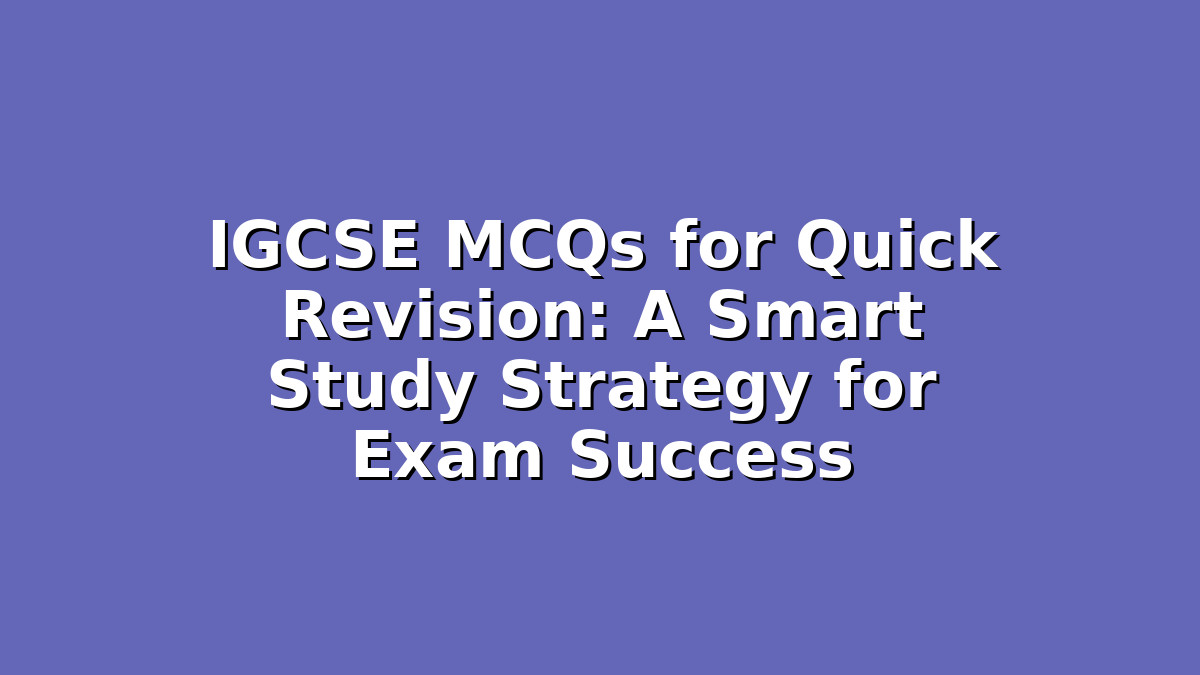Preparing for your IGCSE exams can feel overwhelming, especially when you have a vast syllabus to cover in a limited amount of time. Whether you’re tackling subjects like Mathematics, Biology, Chemistry, or History, finding efficient ways to revise is essential. One effective method many students turn to is practicing Multiple Choice Questions (MCQs). MCQs offer a quick, interactive way to test your knowledge, identify areas of weakness, and reinforce key concepts.
In this article, we will explore how IGCSE MCQs can be a powerful tool for quick revision. We will also share practical study tips to help you maximize your revision sessions and boost your confidence before exam day.
Why Use MCQs for IGCSE Quick Revision?
When preparing for the IGCSE exams, time management is crucial. MCQs allow you to cover a broad range of topics quickly, helping you to recall facts, formulas, and concepts. Unlike longer structured questions, MCQs test your ability to recognize correct answers and eliminate wrong options, which sharpens your critical thinking.
Moreover, MCQs provide instant feedback if you use online quizzes or practice books with answer keys. This immediate insight helps you to pinpoint exactly which topics need more study, preventing wasted time on material you already know well.
Section 1: Incorporate Regular MCQ Practice into Your Study Routine
Consistency is key when revising for any exam, and MCQs are no exception. To get the most benefit, try to include MCQ practice in your daily or weekly study timetable. Here’s how to do it effectively:
– Set Specific Goals: Dedicate 20-30 minutes each day to answering MCQs from different subjects. For example, Monday might be for Science, Tuesday for English, and so forth. This keeps revision balanced.
– Use Reliable Resources: Use past IGCSE papers, revision guides, or trusted online platforms that provide subject-specific MCQs aligned with the IGCSE curriculum.
– Review Your Mistakes: After completing a set of MCQs, carefully review the questions you got wrong. Understand why the correct answer is right and why your choice was incorrect. This reflective practice ensures deeper learning.
– Track Your Progress: Keep a revision journal or spreadsheet to record your scores and areas of difficulty. Tracking progress helps maintain motivation and allows you to adjust your study plan as needed.
By making MCQ practice a regular habit, you build familiarity with exam formats and improve your speed and accuracy, both vital for exam day success.
Section 2: Combine MCQs with Other Revision Techniques
While MCQs are excellent for quick recall and concept reinforcement, they should be part of a broader revision strategy. To enhance your understanding and retention, try combining MCQs with other study methods:
– Summarize Key Concepts: After practicing MCQs on a topic, write down a brief summary or create flashcards. This helps consolidate what you’ve learned.
– Mind Mapping: For subjects with interconnected ideas, like Geography or History, create mind maps to visualize relationships between concepts. Then test yourself with MCQs related to those themes.
– Group Study Sessions: Discuss MCQ questions with classmates or friends preparing for IGCSE. Explaining answers aloud reinforces your knowledge and can uncover new perspectives.
– Timed Practice Sessions: Simulate exam conditions by answering MCQs within a set time. This trains you to think quickly and manage time effectively during the actual exam.
By integrating MCQs with other revision techniques, you engage multiple learning styles, which leads to better understanding and recall.
Section 3: Tips for Maximizing MCQ Effectiveness on Exam Day
Practicing MCQs is beneficial during revision, but it’s equally important to apply effective strategies during the exam itself. Here are some tips for tackling MCQ papers confidently:
– Read Each Question Carefully: Pay close attention to wording and look for keywords that may affect the meaning. Sometimes, a single word like “not” or “except” changes the entire question.
– Eliminate Obviously Wrong Answers: Narrow down your choices by crossing out answers you know are incorrect. This improves your chances if you need to guess.
– Don’t Overthink: MCQs often test your quick recall rather than deep analysis. Trust your initial instincts but verify when in doubt.
– Be Aware of Negative Marking: If your exam includes negative marking for wrong answers, avoid random guessing. Only guess if you can eliminate one or more options.
– Manage Your Time: Allocate time for each question and move on if stuck. Return to difficult questions after completing easier ones to avoid running out of time.
Following these approaches can boost your accuracy and efficiency, helping you maximize marks on the day of the exam.
Conclusion
IGCSE MCQs are an invaluable resource for quick and effective revision. They help you cover wide-ranging topics rapidly, identify areas needing improvement, and build exam confidence. Incorporating MCQs into your daily study routine, combining them with other revision techniques, and employing smart strategies during the exam can make a significant difference in your performance.
Remember, success in IGCSE exams isn’t just about hard work but also about working smart. Use MCQs as a powerful part of your revision toolkit to stay motivated, learn efficiently, and approach your exams with confidence.
Good luck with your studies—you’ve got this!

Responses